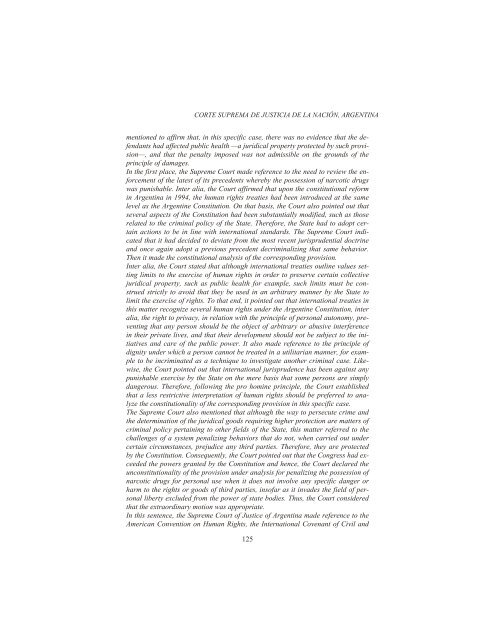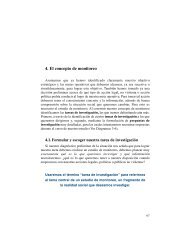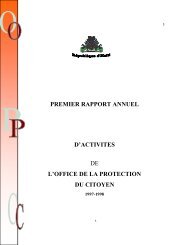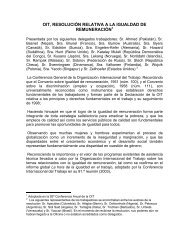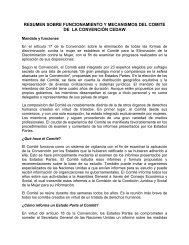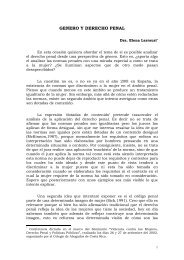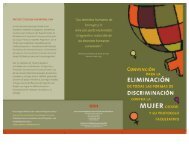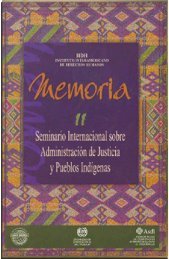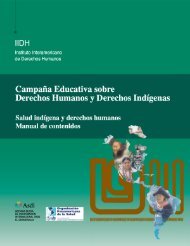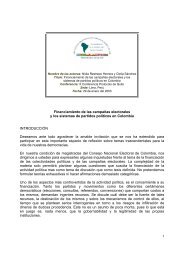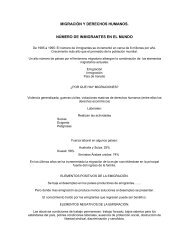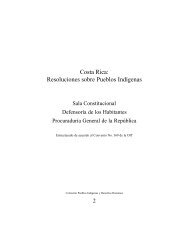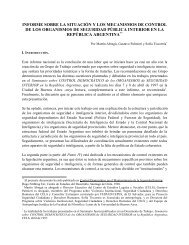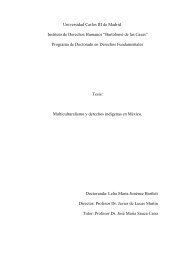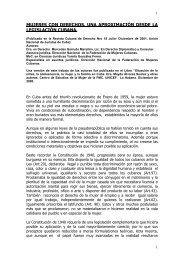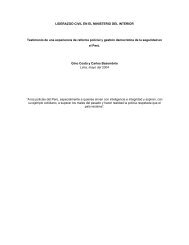diálogo jurisprudencial - Instituto Interamericano De Derechos ...
diálogo jurisprudencial - Instituto Interamericano De Derechos ...
diálogo jurisprudencial - Instituto Interamericano De Derechos ...
You also want an ePaper? Increase the reach of your titles
YUMPU automatically turns print PDFs into web optimized ePapers that Google loves.
CORTE SUPREMA DE JUSTICIA DE LA NACIÓN, ARGENTINA<br />
men tioned to af firm that, in this spe cific case, there was no ev i dence that the de -<br />
fen dants had af fected pub lic health —a ju rid i cal prop erty pro tected by such pro vi -<br />
sion—, and that the pen alty im posed was not ad mis si ble on the grounds of the<br />
prin ci ple of dam ages.<br />
In the first place, the Su preme Court made ref er ence to the need to re view the en -<br />
force ment of the lat est of its pre ce dents whereby the pos ses sion of nar cotic drugs<br />
was pun ish able. Inter alia, the Court af firmed that upon the con sti tu tional re form<br />
in Ar gen tina in 1994, the hu man rights trea ties had been in tro duced at the same<br />
level as the Ar gen tine Con sti tu tion. On that ba sis, the Court also pointed out that<br />
sev eral as pects of the Con sti tu tion had been sub stan tially mod i fied, such as those<br />
re lated to the crim i nal pol icy of the State. There fore, the State had to adopt cer -<br />
tain ac tions to be in line with in ter na tional stan dards. The Su preme Court in di -<br />
cated that it had de cided to de vi ate from the most re cent ju ris pru den tial doc trine<br />
and once again adopt a pre vi ous pre ce dent de crim i nal iz ing that same be hav ior.<br />
Then it made the con sti tu tional anal y sis of the cor re spond ing pro vi sion.<br />
Inter alia, the Court stated that al though in ter na tional trea ties out line val ues set -<br />
ting lim its to the ex er cise of hu man rights in or der to pre serve cer tain col lec tive<br />
ju rid i cal prop erty, such as pub lic health for ex am ple, such lim its must be con -<br />
strued strictly to avoid that they be used in an ar bi trary man ner by the State to<br />
limit the ex er cise of rights. To that end, it pointed out that in ter na tional trea ties in<br />
this mat ter rec og nize sev eral hu man rights un der the Ar gen tine Con sti tu tion, inter<br />
alia, the right to pri vacy, in re la tion with the prin ci ple of per sonal au ton omy, pre -<br />
vent ing that any per son should be the ob ject of ar bi trary or abu sive in ter fer ence<br />
in their pri vate lives, and that their de vel op ment should not be sub ject to the ini -<br />
tia tives and care of the pub lic power. It also made ref er ence to the prin ci ple of<br />
dig nity un der which a per son can not be treated in a util i tar ian man ner, for ex am -<br />
ple to be in crim i nated as a tech nique to in ves ti gate an other crim i nal case. Like -<br />
wise, the Court pointed out that in ter na tional ju ris pru dence has been against any<br />
pun ish able ex er cise by the State on the mere ba sis that some per sons are sim ply<br />
dan ger ous. There fore, fol low ing the pro homine prin ci ple, the Court es tab lished<br />
that a less re stric tive in ter pre ta tion of hu man rights should be pre ferred to an a -<br />
lyze the con sti tu tion al ity of the cor re spond ing pro vi sion in this spe cific case.<br />
The Su preme Court also men tioned that al though the way to per se cute crime and<br />
the de ter mi na tion of the ju rid i cal goods re quir ing higher pro tec tion are mat ters of<br />
crim i nal pol icy per tain ing to other fields of the State, this mat ter re ferred to the<br />
chal lenges of a sys tem pe nal iz ing be hav iors that do not, when car ried out un der<br />
cer tain cir cum stances, prej u dice any third par ties. There fore, they are pro tected<br />
by the Con sti tu tion. Con se quently, the Court pointed out that the Con gress had ex -<br />
ceeded the pow ers granted by the Con sti tu tion and hence, the Court de clared the<br />
un con sti tu tion al ity of the pro vi sion un der anal y sis for pe nal iz ing the pos ses sion of<br />
nar cotic drugs for per sonal use when it does not in volve any spe cific dan ger or<br />
harm to the rights or goods of third par ties, in so far as it in vades the field of per -<br />
sonal lib erty ex cluded from the power of state bod ies. Thus, the Court con sid ered<br />
that the ex traor di nary mo tion was ap pro pri ate.<br />
In this sen tence, the Su preme Court of Jus tice of Ar gen tina made ref er ence to the<br />
Amer i can Con ven tion on Hu man Rights, the In ter na tional Cov e nant of Civil and<br />
125


